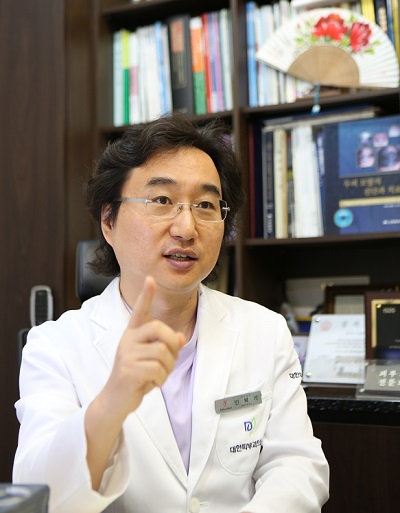Discussing countermeasures even at 3 a.m.…. public health’s movable testing also played a role
· ①[COVID-19 Interview Series] Jeong Ho Yeong, CEO of Kyungpook National University Hospital
· ②[COVID-19 Interview Series] Min Pokkee, director of the COVID-19 Countermeasures Division, Daegu Medical Association
· ③[COVID-19 Interview Series] Cha Soon Do, Chairman of Medi-City Daegu Association
Daegu City, which went through the hardest chapter in the country due to COVID-19 mass infection from the Shincheonji Church, is now experiencing only a small number of confirmed cases as medical staff and citizens are united for a breakthrough of the disease. The biggest heroes in this crisis were the medical staff in Daegu. As a small appreciation of their hard work, we interviewed them in a series. We met Jeong Ho Yeong, CEO of Kyungpook National University Hospital, Min Pokkee, the director of Daegu Medical Association's COVID-19 Countermeasures Division, and Cha Soon Do, the chairman of Medi-City Daegu Association. <Editor’s Note>

- Daegu Medical Association focused on putting efforts into securing hospital beds after diagnosing the first case. Why did you prioritize this?
Based on the result of analyzing and collecting various data from the China network of the Medi-City Daegu in January when COVID-19 began to spread, we predicted occurrences of rapid transmission rate, asymptomatic infections, countless confirmed cases, and elderly patients with underlying diseases turning into severe cases with a fatality rate of 5-10%. We were sure thousands of confirmed cases would abruptly occur like Wuhan, China.
After seeing 10 people confirmed positive consecutively until the next morning ever since the first confirmed case on February 18, we decided that securing the hospital beds was the most urgent action to take.
- It is expected that there was panic due to the sudden increase in the number of confirmed cases. It might have been difficult to choose, but which one was the top priority: treatment, prevention, and the number of beds?
After the announcement of the first confirmed case in Daegu on February 18th, we spent a tough time until the report of 741 confirmed cases a day on the 29th. We expected it, but there was so much to prepare that we slept less, and our mental and physical strength ran out. Nevertheless, we stayed as alert as possible and made priorities.
We have discussed with the preventive medicine specialists and professors from the Center for Infectious Disease Control and Prevention at Situation Countermeasures Headquarters and concluded that the system for classifying mild and severe cases is the most essential. The Daegu Medical Association volunteer group was able to well categorize patients with mild or severe illness through phone monitoring to facilitate hospitalization to the community treatment center or the hospital. Fortunately, no one passed away during on wait for hospitalization after confirmed positive.
- Collecting up to samples of 4,000 people per day has become possible from taking 1 hour per person in the beginning. What is the secret method?
It was possible through this new method of sample collection: a mobile sample collection like drive-thru testing. As the mobile, mass testing in Daegu became widely known, we received a lot of inquiries from the U.S. and Russian media and other foreign organizations regarding specific methods.
- Patients who already were hospitalized might have gone through confusions on diagnosis when patients with COVID-19 came in. How did you manage infection?
To improve medical service and health care quality of Daegu, a city brand Medi-City Daegu was created by the municipal government and health & medical institutions in 2009, where five medical institutions or organizations are now organically operating. The Medi-City Daegu served as the focal point for the resolution.
The mayor of Daegu and directors of medical institutions have done almost the impossible by discussing and implementing countermeasures via phone and social media, even at 3 and 5 in the morning. Infection control seems to have been possible because medical institutions have organically transferred inpatients and have done their best to share their work.
- With the voluntary cooperation of medical staff and citizens, COVID-19 entered a stable phase. But I don't think we can be relieved yet, until when should we be careful?
Right. Korea's quarantine is viewed as a success overseas because people are good at keeping social distancing. Daegu and Gyeongbuk citizens well adhered to the principles of wearing masks and keeping social distancing, even when economically troubled. The virus is likely to become more prevalent again in Fall and winter as the weather becomes dry and cold. Please continue to follow the government's guidelines for preventing COVID-19 infection.
- The government has extended social distancing until May 5 to overcome COVID-19. However, resort pensions in Jeju and Gangwon-do are fully booked, making social distancing meaningless.
Everyone should remember the current situation around the world. COVID-19 is not an infectious disease that can die out if only a country or city puts an effort. When social distancing is well maintained, then the spread slows down, but when it is loosened for even a slight bit, the infection rate increases again. Therefore, it is significant to pay attention to important precautions, such as wearing a mask and washing your hands while observing each country's actions and situations.
- The whole world is suffering from COVID-19. Is there a way to solve this?
The withdrawal of this pandemic will be very different from that of MERS. Like an unidentified flying object that still has many parts unknown, so is COVID-19 with the rapid transmission, asymptomatic infection, and re-confirmed positive after recovery. The world needs to collaborate to invent and share vaccines, treatments, and prevention methods. I think we should create a cooperative system around the world, using this opportunity in preparation for other future outbreaks of infectious diseases.
- South Korea's infection response system is excellent. However, its improvement points might have been revealed by COVID-19, what do you think needs to be fixed?
This time, the dedication of private medical institutions, many volunteers, public officials, and medical staff helped maintain the infection response system. However, it is impossible to rely solely on their sacrifice and dedication all the time. In the future, infectious diseases will periodically threaten humanity.
It’s necessary to support epidemiologists and infectious disease researchers, build an infection response system from a preventive medical point of view, establish infectious disease hospitals and research labs by region, and conduct infectious disease response training via close relationship and division of duties between public institutions like military's medical commands, military hospitals, Centers for Disease Control and Prevention, and local public health centers. And now, as a leading medical advanced country in the world, South Korea should play a role and contribute to the international community.


